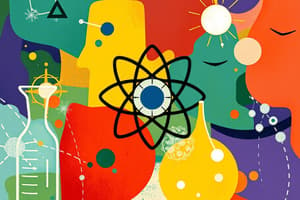Podcast
Questions and Answers
What is a defining characteristic of scientific observations?
What is a defining characteristic of scientific observations?
- They rely on subjective interpretations.
- They are based on personal beliefs.
- They are objective and can be independently verified. (correct)
- They can be understood differently by different individuals.
Which of the following best describes the principle of parsimony in science?
Which of the following best describes the principle of parsimony in science?
- Explanations should be based on authority rather than simplicity.
- Complex explanations are preferred over simple ones.
- All phenomena must have multiple explanations.
- The simplest explanation is preferred when accounting for phenomena. (correct)
How does science typically respond to new evidence?
How does science typically respond to new evidence?
- By adhering strictly to traditional views and methods.
- By allowing new evidence to revise or correct previous knowledge. (correct)
- By dismissing previous beliefs with no reassessment.
- By claiming absolute truth regardless of new data.
What does it mean for science to be progressive?
What does it mean for science to be progressive?
What differentiates scientific knowledge from nonscientific knowledge?
What differentiates scientific knowledge from nonscientific knowledge?
What assumption do scientists generally make about the reality of the world?
What assumption do scientists generally make about the reality of the world?
In what way is the role of authority in science different from other fields?
In what way is the role of authority in science different from other fields?
What characteristic makes scientific knowledge tentative?
What characteristic makes scientific knowledge tentative?
What does common-sense realism emphasize about the perception of objects?
What does common-sense realism emphasize about the perception of objects?
Which concept assumes that events do not occur randomly and have reasons behind them?
Which concept assumes that events do not occur randomly and have reasons behind them?
What is the primary goal of the scientific method regarding the description of phenomena?
What is the primary goal of the scientific method regarding the description of phenomena?
What does the criterion of 'temporal precedence' refer to in establishing cause-effect relationships?
What does the criterion of 'temporal precedence' refer to in establishing cause-effect relationships?
Which statement best describes the concept of regularity in science?
Which statement best describes the concept of regularity in science?
What is the main purpose of discovering laws in science?
What is the main purpose of discovering laws in science?
What does discoverability imply about scientific knowledge?
What does discoverability imply about scientific knowledge?
In the context of common-sense realism and scientific understanding, how do perceptions differ between laypersons and scientists?
In the context of common-sense realism and scientific understanding, how do perceptions differ between laypersons and scientists?
Flashcards are hidden until you start studying
Study Notes
Characteristics of Science
- Empirical: Science relies on experience over authority, common sense, or logic.
- Objective: Knowledge is based on objective observations that can be consistently repeated by any observer in the same context.
- Self-Correcting: Science adapts as new evidence arises, challenging and refining existing knowledge.
- Progressive: Science continually evolves towards truth, building upon previous findings.
- Tentative: Claims are never absolute; science acknowledges the potential for current knowledge to become outdated.
- Parsimonious: The simplest explanations are preferred when accounting for phenomena, as long as they align with other factors.
- Theory-Based: Science values theoretical frameworks, contrasting with technology, which can advance without theoretical underpinning.
Relation Between Science and Nonscience
- Authority's Role: In science, authority influences less than in other areas, prioritizing empirical evidence over hierarchical claims.
- Working Assumptions:
- Reality: Scientific study operates under realism, assuming objects exist independently of observation.
- Rationality: The nature of the world is comprehensible through logical reasoning.
- Regularity: Laws of nature remain consistent across time and space, forming a foundation for scientific inquiry.
- Discoverability: Understanding the world is achievable without divine revelation or predetermined texts.
- Causality: Events are interconnected with causes; the criteria for establishing cause-effect relationships include:
- Temporal precedence: Establishing which event occurs first.
- Covariation: Observing the correlation where the cause leads to the effect.
- Co-variation: Identifying statistical associations between cause and effect.
- Elimination of alternative explanations: Ensuring no other factors could account for the observed effect.
Goals of Science
- Discovery of Regularities: Identify patterns in phenomena to inform scientific laws and theories.
- Description: Clearly define the events and entities under investigation, establishing the subject matter for scientific analysis.
- Laws Discovery: Formulate laws that indicate consistent relationships between events, acknowledging that some laws are probabilistic rather than absolute.
- Searching for Causes: Investigate the underlying causes of phenomena to develop a deeper understanding of scientific principles.
Studying That Suits You
Use AI to generate personalized quizzes and flashcards to suit your learning preferences.




